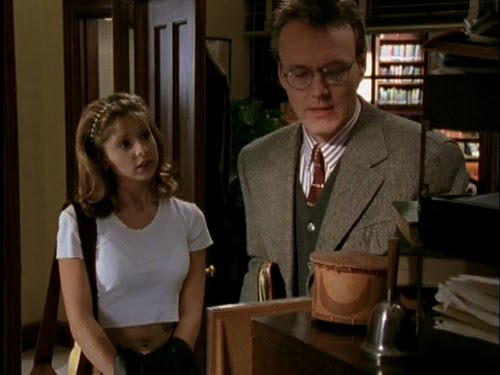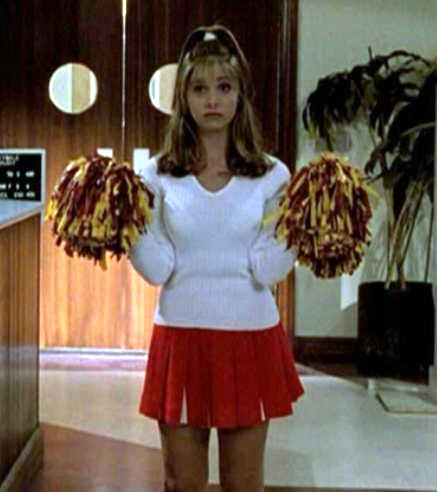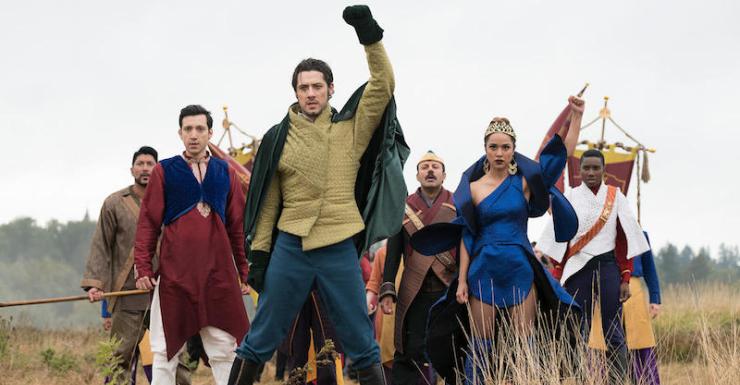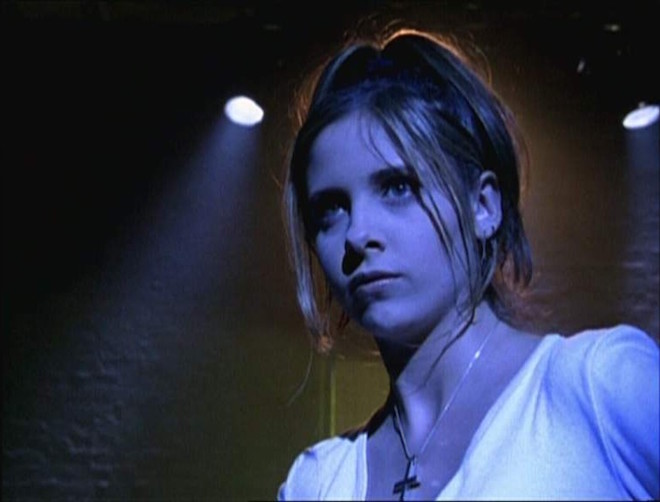I’m smothering myself in things I love, right now, and I’ve got this crushed-out, almost-butterflies feeling in my stomach — a feeling that’s like sparkling possibility and nervousness and I know this one; I know it really well. It eludes me, from time to time, where things and falling in love with them is concerned. I get gray and dull and faded around the edges and I like things a lot, but nothing gets past whatever it is that’s blunting the edges on things. But not right now.
(Things are not the same as people, and really, maybe I just got overwhelmed on the people side of love and slipped on the things. To have both! — the breathlessness of discovering a story or a song, and the perpetual grin of constantly discovering a person — is a wealth of riches.)
From time to time in my life, I’ve found myself comfort-playing videogames. It’s like comfort eating, but instead of food that’s sweet in its familiarity, it’s stories through which I guide a small pixelated person or elf or, um, bear with a bird in his backpack. I’ve never even beaten most of the games I comfort-play, with the exception of The Legend of Zelda: Ocarina of Time, which I still think is the best game ever. I don’t like boss battles and I really dislike final boss battles; I play these games for fun, for the adventure and the puzzles, and when they get too hard — when the eerie sky city in Twilight Princess gets too frustrating — I set them aside again.
But for that stretch of time, which often involves five-hour windows in which I lose track of time, I’m immersed. It’s Zelda, or it’s Mario, or it’s Banjo-Kazooie (but mostly it’s Zelda). I know, every time, what I’m doing: avoiding something. The further I wander into one of those labyrinthine caverns that may or may not have a heart piece at the end, or the longer I spend trying to collect every spider or golden bug, the more I’m avoiding something. Maybe it’s a task, or a truth, or an obligation. There’s no better place to hide from it than in the glow of the TV screen.
I did this earlier this year, putting off beginning the job application process while playing through a few levels of Banjo-Kazooie, which I hadn’t been able to play for years because I didn’t have an old TV, and N64 games look terrible on high-definition screens. Was it a waste of time? Maybe. Maybe not.
There are things I do better when I’m multitasking, but it’s a specific task; I need something to take up one part of my mind so the rest of me can relax. I drive better and I play pinball better when I’m singing along to familiar songs under my breath. (This is probably true of a lot of things, actually.) I think better when I’m in the shower. And I process semi-subconscious issues better when I’m immersed in the particular engaged/unengaged worldplay that videogames, especially a certain kind of platformer, offer.
I always know I’m avoiding something. I also know I’ll face it when I’m ready.
All of this was on my mind when I read Tom Bissell’s excellent but poorly subtitled Extra Lives: Why Video Games Matter. Someone gave that book that subtitle with the greatest of intentions, but the truth is, Bissell’s personal, vibrant book isn’t about why video games matter in general; it’s about why they matter to him, and that’s exactly why I like it: It’s an engrossing and honest look at the way these particular kinds of stories work, and matter, in Bissell’s life. I have a lot of thoughts about that book, but that’s not what this post is about.
It’s about Ernest Cline’s Ready Player One, a book that lands, with incredible timing, in the middle of what feels like a steady stream of articles about nostalgia. Ready Player One is fueled by that nostalgia, that peculiar love people of my generation have for the TV shows and lunchboxes and Matthew Broderick movies and game systems we grew up with. (Do other generations have the same thing? Probably, but I’d bet it’s different for each one, and I wouldn’t presume to speak for them.) But Cline’s book doesn’t just feed, parasite-like, off a shared affection for the cartoon characters and music videos and concept albums that provide their fans with a set of shared experienced and a specialized language (if I say I ordered a pan-galactic gargle blaster, you instantly know, if you’re One of Us, what the hell I’m talking about, right?). Cline does something much better, and something I’m having a hard time explaining.
He makes it about the love. There are competitive nerds and reclusive nerds and social nerds, and all the nerd types overlap — and not everyone with a nostalgic streak is a nerd. But part of being a nerd, or being nerdy, is loving things unabashedly and passionately. Love like that is the opposite of the irony that seeps into a different kind of nostalgia/nerd experience, where you have to laugh at yourself, not with yourself, to display your distance from whatever you’re sort of appreciating. Love is what gets scarred out of your public face when you’re a young nerd, when your enthusiasm bubbles too hot and someone sees it for the vulnerable space it is.
Ready Player One is built on one socially inept genius’s love for the stories and experiences of his childhood. Movies, video games, records, TV series — you can love them all you want, quietly and privately, and they don’t bite back. Sharing that love can be trickier. That, one character theorizes, is what led James Halliday, the inventor of the book’s immersive virtual world called the OASIS, to create an elaborate quest game that began upon his death. The winner will find an Easter egg hidden within the Oasis (and inherit Halliday’s computer-genius wealth).
Because Cline is clever, more is at stake than one man’s wealth and virtual power, though virtual power is nothing to scoff at, in this world. To be too detailed about the book would be to spoil the fun that is trying to puzzle through Halliday’s riddles, all of which involve the late-twentieth-century pop culture he loved, and most of which are downright devilish. The real world is a mess, and there’s a corporation trying to win the contest in order to privatize and monetize the Oasis, and our heroes and heroines are a bunch of nerds who go to virtual schools and hang out in virtual chat rooms and know each other through blogs and v-chats and everything else in the OASIS, which has taken over what the internet started.
Some people will hate this book. It’s quick and clever and runs at a speed that screams Make me into a screenplay!, and a couple of plot wrinkles tested even my very willing suspension of disbelief. And it’s nostalgic, kinda-sorta, but also not. All that pop culture detritus that looks like nostalgia to us is, in 2044 when the story takes place, useful knowledge. History. Cline gives a reason for knowing all the words to ’70s songs and recognizing scenes from ’80s movies. Idealistic? Indulgent? It could be, but it isn’t; it’s inventive and fun, and Cline never dwells too long in a game or a movie scene, moving right along, alternating our hero’s solo jaunts through the quest with his interactions with a handful of other “gunters” (short for egg hunters).
Ready Player One never quite reaches the emotional levels I wanted it to, but I still devoured it in two sittings, trying and failing to tear myself away. It’s as compulsively readable as those games I love are compulsively playable — the next level, the next chapter, the wanting to see what happens when you find that next dungeon, or Cline’s hero finds the next clue — and it plays on all the things that let me lose myself in a story: a quest setting; rich, relevant-to-my-interests detail; the triumph of the nerd class; a tendency to slip away from the real world into the virtual (or fictional) one and then have to tear yourself back out again. Online friendships get their due, but so does reality; knowing what was and seeing what is are both important.
I put the book down, grinned, turned on the computer, clicked play on The Joy Formidable’s The Big Roar, and realized Tim Kasher is playing tonight. I have a second job interview on Friday and I’m going to Oregon in a little over a week. I want to listen to all my favorite records, I want to see all my favorite people, and I want to write.
Don’t just read all the things. Love all the things. Sometimes I just need a reminder.



